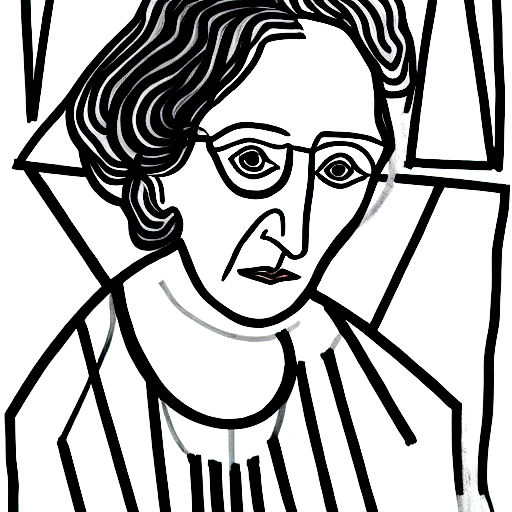Adeline Virginia Woolf (née Stephen; 25 January 1882 – 28 March 1941) was an English writer, considered one of the most important modernist 20th-century authors and a pioneer in the use of stream of consciousness as a narrative device.
Woolf was born into an affluent household in South Kensington, London, the seventh child of Julia Prinsep Jackson and Leslie Stephen in a blended family of eight which included the modernist painter Vanessa Bell. She was home-schooled in English classics and Victorian literature from a young age. From 1897 to 1901, she attended the Ladies' Department of King's College London, where she studied classics and history and came into contact with early reformers of women's higher education and the women's rights movement.
Encouraged by her father, Woolf began writing professionally in 1900. After her father's death in 1904, the Stephen family moved from Kensington to the more bohemian Bloomsbury, where, in conjunction with the brothers' intellectual friends, they formed the artistic and literary Bloomsbury Group. In 1912, she married Leonard Woolf, and in 1917, the couple founded the Hogarth Press, which published much of her work. They rented a home in Sussex and moved there permanently in 1940. Woolf had romantic relationships with women, including Vita Sackville-West, who also published her books through Hogarth Press. Both women's literature became inspired by their relationship, which lasted until Woolf's death.During the inter-war period, Woolf was an important part of London's literary and artistic society. In 1915, she had published her first novel, The Voyage Out, through her half-brother's publishing house, Gerald Duckworth and Company. Her best-known works include the novels Mrs Dalloway (1925), To the Lighthouse (1927) and Orlando (1928). She is also known for her essays, including A Room of One's Own (1929). Woolf became one of the central subjects of the 1970s movement of feminist criticism and her works have since attracted much attention and widespread commentary for "inspiring feminism". Her works have been translated into more than 50 languages. A large body of literature is dedicated to her life and work, and she has been the subject of plays, novels and films. Woolf is commemorated today by statues, societies dedicated to her work and a building at the University of London.
Throughout her life, Woolf was troubled by mental illness. She was institutionalised several times and attempted suicide at least twice. According to Dalsimer (2004) her illness was characterised by symptoms that today would be diagnosed as bipolar disorder, for which there was no effective intervention during her lifetime. In 1941, at age 59, Woolf died by drowning herself in the River Ouse at Lewes.
Sol turns thousands of years of human wisdom from the world’s spiritual traditions into a totally unique personality profile. To get your own profile, check compatibility with friends and much more, download the Sol App today.
Some of their strengths
Virginia Woolf has many admirable traits.
Based on spiritual traditions from around the world, they are someone who can be described as Intelligent, Altruistic, Intellectual, Analytical, Easygoing, Honest, and Energetic.
Idealistic and Altruistic
According to Mysticism’s Astrology tradition, Virginia Woolf is someone who is an idealist and an altruist who possesses an innovative, intellectual, and analytical mind, and who approaches life in an optimistic and easygoing manner. A person who sees life as a journey not a destination.
Strong and Resilient
Based on Daoism’s Ba-Zi or ‘Chinese Zodiac’ tradition, people who know Virginia Woolf well know them as someone who can be strong, expansive, and stable like a big tree.
Productive and Perseverent
According to Hinduism’s Jyotisha or ‘Vedic Astrology’ tradition, many would also describe Virginia Woolf as someone who is productive, persevering, deliberate, and direct.
A person who is creative, has good luck with work and money, good listening skills, good relationships with people at work, is a good teacher or counselor, and who is good at organizing groups, teams, or causes.
Easygoing and Energetic
Based on the Mayan Tzolk’in or ‘Mayan Astrology’ tradition, Virginia Woolf is someone who has an easygoing nature and a healthy sense of humor, with a mind that requires constant stimulation in order to feel fulfilled.
They are also someone who is balanced, stable, and energetic, who likes the idea of home and family, and who is very comfortable being the person in charge.
Altruistic and Innovative
According to Judaism’s Kabbalah tradition, Virginia Woolf tends to be someone who sacrifices things for the good of others and wants to do "good" in the world. Who is often thought of as an innovator or rebel who thrives when trying to chase a breakthrough of some sort, who has a clear and sound mind, and who can be charming and sociable.
Some of Virginia Woolf's challenges
While Virginia Woolf has many strengths, nobody is perfect. They also have some challenging traits they need to manage.
For example, Virginia Woolf can be Stubborn, Rebellious, Emotionally Distant, Short-tempered, Impulsive, Hypocritical, and Self-centered.
Rebellious and Emotionally Distant
One of Virginia Woolf's key challenges is that they are someone who can be rebellious and emotionally distant.
Virginia Woolf must also exercise caution as they can have difficulty dealing with responsibility, authority, or criticism.
Possessive and Stubborn
Virginia Woolf is someone who can be possessive, jealous, inflexible, and stubborn, can have a habit of being a frivolous spender, and who can feel insecure or cynical in romantic relationships and have difficulty forming productive personal and professional partnerships.
Serious and Callous
Finally, Virginia Woolf also can be too giving, come across as too "high and mighty", and can have a hard time expressing feelings.

